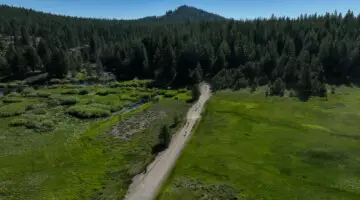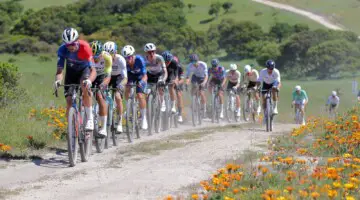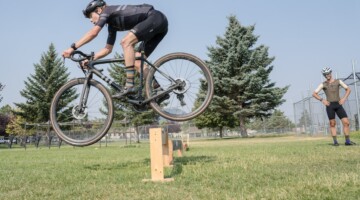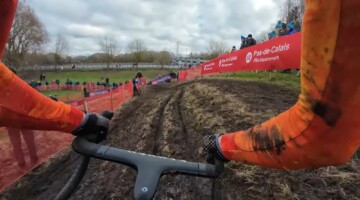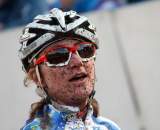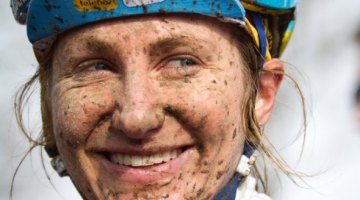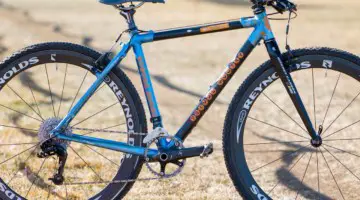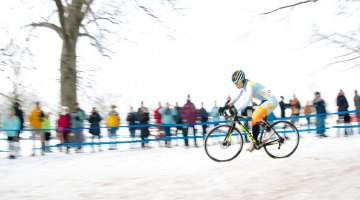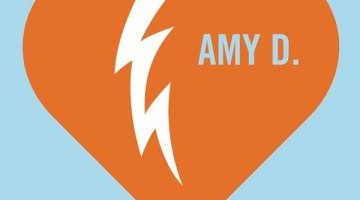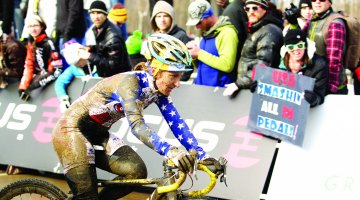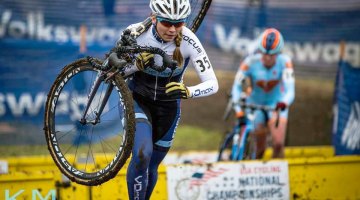Since she started racing in 2006, Amy Dombroski has had a remarkable rise to cyclocross fame. She’s also been a great contributor to Cyclocross Magazine, writing for our Rider Diary section about her race at Hoogerheide, a reflection on 2011 Worlds and the season in general. Lately, she’s been prepping for the fall season, mixing it up at various road and mountain bike events, most recently the back-to-back World Cup races in Dalby Forest and Offenburg. Lucky for us at Cyclocross Magazine, she had a few hours in a car this weekend, giving her time to answer our questions between races.
Keep an eye out for more on Dombroski in Issue 13 of Cyclocross Magazine, which will feature her,along with Jamey Driscoll and Lea Davison, talking about their hometown of Jericho, Vermont.
Cyclocross Magazine: How has racing in the off-season been going thus far, especially since mountain biking is a relatively new discipline for you?
Amy Dombroski: So far this season I have been struggling, I keep injuring myself. It’s difficult to not get bummed out when I keep getting setbacks, especially when the weather is so nice and my friends are in their “on-season.” But then I need to remind myself that I still have time until ’cross season (though it’s rapidly approaching!) I enjoy mountain biking, both training and racing, and that’s why I swapped from road to mountain biking, but I have loads to learn. The World Cups were eye-opening to observe all the areas I need to improve. While being somewhat of a shock, it’s also exciting because it’s similar to that excitement of starting a new sport or sitting down with a pen, fresh sheet of paper and the first line of a poem you want to roll with. There are so many ways to grow and learn and really any step toward improving you take will be “the right step.”
CXM: How do you think mountain biking will help your cyclocross?
AD: Last season was my first mountain bike season, and my bike handling improved massively. In the two weeks with Dalby and Offenburg, I think I built two-fold on all I learned last season. I feel very fortunate Crank Brothers has trusted me to design a mountain bike season around my plans for the ’cross season. I’ve been able to choose races which I feel are good experience races combined with those that are good exposure for my sponsors. This has allowed me low stress for the physical setbacks, while also offering time to train both my engine and technical skills. Mountain bike racing is similar to ’cross in that it’s a more technical and longer ’cross race. There’s no hiding if you’re having a bad day. You need to be on-form 100% while concentrating to maneuver tech-y bits. I think the top end mountain bikers are the best athletes in the world.
CXM: What’s your next big race goal for summer?
AD: I am racing Marathon Worlds which is in Montebelluna, Italy, near the Crank Brothers Italian headquarters. After Offenburg I was intending a big block of hours, but my knee is foddered, so my training won’t be ideal for the race. But sometimes forced rest is the best training! Then the next target and season-concluding mountain bike race will be Nationals in Sun Valley before a small break, then local racing to get ready for a big ’cross season.
CXM: Do you have any specific goals for cyclocross season?
AD: I will start the ’cross season with CrossVegas, the Catamount races back home in Vermont, Madison USGPs, then head over to Europe for the rest of season. I have over 30 races on my provisional ’cross race calendar, and for the first time I’ll be racing after Worlds through Feb.
CXM: How will you prep for the cyclocross season?
AD: A short break after Mountain Bike Nationals before logging miles in August at local Boulder races. Then to my dad’s in Vermont for the Green Mountain Stage Race followed by the start of ’cross season!
CXM: What’s a typical week look like for you (training and race-wise) during the season?
AD: The provisional ’cross calendar holds races just about every weekend, but being based in Belgium, this won’t have nearly the stress value of racing every weekend in the US, as nearly every race is within an hour drive. Typically one or two mellow days following race day, a two day block of training, then the rest of week depends on what the race is and where it is. In the US, it’s mostly two days of races, both Saturday and Sunday, so it will be different this season with most races just on Sunday. It allows one more day of training or recovery.
CXM: What’s your favorite part about cyclocross compared to the other cycling events you do?
AD: The atmosphere. I love the fans, the followers; and I love for them that it’s an exciting event to watch. I like that ’cross is a shorter event … those 24-hour races seem like massive death. I like that it’s full-on racing for those 40 or 60 minutes, all the effort condensed, read on the racers’ faces and on display for the entire circuit of crowd-friendly heckling.
CXM: What kind of bike do you ride, and who will you be riding for this fall?
AD: With Crank Brothers and Ibis as headlining sponsors, we are building The Crank Brothers Race Club, which is in one manner a World Cup caliber off-road racing program while also being an exhibit of our love for simple, classic design and the beauty of women on bikes. In January we plan to bring on three additional women.
I am riding the Ibis Mojo for cross-country, the Tranny for short track and sprint eliminators, the Hakkalugi for cyclocross and the Silk on the road.
[Ed. Note: check out our profile of Dombroski’s bike from last season, a Ridley X-Fire.]
CXM: Any thoughts on Madison next January?
AD: Oof … it’s gonna be cold. I think we need to consider what we’re trying to accomplish. ’Cross in the US is growing exponentially in it’s own unique way. Are we trying to replicate European ’cross? Or do we want to have our own ’cross dialect, equally as wicked but different? With the States donning the World Championships, I think it is wise to have our Nationals at the same time as the Europeans. On the other hand, for the schedule of races, I am planning this season based in Belgium. It adds a big flight for one race, between the Zolder and Liéven World Cups, so to be honest, this trip is something I still need to make a decision on. I have the first half of my season sorted and once I have some races in my legs, we will reassess the schedule.
Because this is Women’s Wednesday, we didn’t just want to hear about what Dombroski had been up to (though we were psyched to catch up with her on racing, too!) We asked a few questions about what it means to be a woman racing as a pro cyclist, and specifically, as an American woman focusing on cyclocross.
CXM: How does it feel being a woman in the sport? Especially at the highest levels, do you feel like it’s different than being a male pro racer?
AD: What’s rubbish is the lack of equality in money (more an issue in Europe than in the US). But every year it’s getting better; it’s something most promoters are aware of and willing to improve on.
A major emphasis of the Crank Brothers Race Club is recognizing that women on bikes is raw and refined beauty. There are other programs and teams that I think share this vision – Peanut Butter & Co and the USWCDP being just a couple.
[Ed. Note: read about Dombroski’s shift to the Crankbrothers team here.]
CXM: When you first started racing, how did it feel being a woman entering a male-dominated sport?
AD: I guess it never felt male-dominated to me. My older brother got me involved in every sport I ever participated in. I was always the tomboy trying to replicate my brother, and when I began racing, I just tagged along with him and his team: me and the boys, and I liked it, never thought twice about it. It pushed me to try harder and to ride and learn more.
CXM: Do you think there are more women in cyclocross now than a few years ago?
AD: Absolutely. Every year the call-ups take longer and longer, both in the Elite and Master ranks. We saw this with the debacle of start position/call-up at Nationals for the Masters categories. Seems like four or five years ago ’cross was a second-hand thought. Roadies and mountain bikers would throw ’cross in the mix, ‘racing off the couch’ for fun and to keep the legs going. Now we are seeing ’cross specialists; and especially for women, I think this is a recent development.
CXM: Do you see the sport growing for women, both as a casual endeavor and at the pro level?
AD: In the US it’s a working (wo)man’s sport. Most anyone can have fun and be competitive, whether you’re full-on focused, a proper roadie Giro winner racing off the couch, or a mom of three. It’s fun, it doesn’t take your entire day, and you can get by with very few hours on the bike.
In the summer, road and mountain bike seasons compete for headlines (which are overridden by men’s road doping!) Whereas ’cross has it’s own season and even Cyclocross Magazine revolutionizing cycling coverage by keeping ’cross fresh all year long. At the pro level we see mountain biking struggling; it’s not in the glory days of the mid-90s anymore. The NRC calendar dwindles as well. My second year with Webcor saw multiple promoters canceling their races due to lack of sponsorship dollars, and that is a major reason my eyes were opened to mountain biking. In cyclocross, we see promoters competing for dates as well as luring Pros in by stepping up their prize list so the top-three men and women are paid equally (or even a few dollars more than the men at CrossVegas!) Sponsors are realizing the nectar of cyclocross: the fanfare, exposure and the bang for the buck.
CXM: Do you feel like there are any sexist attitudes in the sport?
AD: The US is ahead of Europe in this; with coverage, prize money, spectating, support and sponsorship dollars. ’Cross is widely covered on TV in Europe, but men receive 90% of this coverage. The UCI is still living in the middle-ages with equality, if you look at the minimum prize money grid. But I’ve heard there is a longer term plan to make it equal and I understand it cannot happen overnight.
CXM: Did you feel like it was harder to develop yourself as a pro cyclist because you were female? (In terms of getting lucrative sponsors, etc.)
AD: Yes, making the step from Excel Sports Boulder local team to the lean mean green Webcor Builders pro team was hard, requiring a lot of talking and networking as well as learning how to promote myself. And it was all foreign to me. I think the big thing missing for women are steps; men have good development and feeder programs which I did not have access to.
Being young is a huge advantage for men as in ’cross they have separate World Championships for Junior and U23, whereas Women have solely the Elite World Championships (which didn’t even happen until 2000!)
CXM: Do you feel like your experience as a professional athlete has been impacted by the fact that you’re female, or has it never really been an issue?
AD: “Applying” to a pro-team was like finding a light switch at night; putting my feelers out there and hoping. I was frustrated with it at the time, but now I’m thankful for it because I learned a process of promoting and marketing, and through that process also learned it’s something I’m pretty good at.
CXM: What message would you pass on to young girls who are interested in the sport?
AD: Don’t be afraid to ask questions. It’s easy to contact other pros, whether current pros or ex-pros local to you, on websites or on Facebook. When I was new to the sport, the big names seemed so intimidating and serious and I was petrified to ask questions. But I have found so many humble cyclists who are a wealth of knowledge and are so willing to share and laugh. Behind those flash Oakleys is someone who has their own story and insight.
CXM: What’s the best training advice you have for women entering the sport?
AD: Ride with boys. Ask questions. Have fun.
CXM: Any racing tips for new women?
AD: Positive self talk. It’s amazing how abusive we can be to ourselves, so when you find yourself unable to hold a wheel or navigate a corner try to focus on what you’re doing well or how strong you know you are.

